The Holy Synod of the Church of Cyprus issued a very diplomatic statement on the Ukrainian issue yesterday, though it was not signed by every bishop on the Synod. Without directly placing any blame, the statement is hard on the Russian Church while not criticizing any of the actions of the Patriarchate of Constantinople. Nevertheless, the Cypriot Synod did not recognize the so-called “Orthodox Church of Ukraine” as a legitimate church and has not entered into Eucharistic communion with them.
A translation of the Synodal statement is available on Orthodox Synaxis.
After the Synod’s statement was released, a personal statement from His Eminence Metropolitan Nikiforos of Kykkos was published on the Greek site Romfea, which speaks much more directly about the errors of the Patriarchate of Constantinople’s actions in Ukraine and the impossibility of having communion with the Ukrainian schismatics.
From the moment that the question of the autocephaly of the Ukrainian Church first arose, we have openly spoken in its favor. In communication with various people—both Church and secular—I have insisted that, in essence, the practice that a politically independent country has its own autocephalous Church prevails in Orthodoxy today.
However, I had hoped that this—certainly desirable—autocephalous Orthodox Ukrainian Church would be established not in haste and in a rush, but gradually, with great attention and in agreement with Orthodox tradition, the sacred canons, and generally the totality of the Church-canonical law of our holy Orthodox Church.
Unfortunately, the entire process of proclaiming and recognizing the autocephaly of the Ukrainian Orthodox Church did not proceed by the democratic Orthodox conciliar process; it was not democratic and conciliar sentiments and tendencies that triumphed in it, but, as sad as it is to admit, authoritarian and autocratic.
Although His All-Holiness Ecumenical Patriarch Bartholomew of Constantinople acknowledged and confirmed by his letter more than twenty years ago the deposition and excommunication of Metropolitan Philaret and his followers as schismatics from the Russian Orthodox Church and in general from the Body of the One, Holy, Catholic, and Apostolic Church; although three years ago, at the Synaxis of Primates in 2016, as His Beatitude Patriarch Kirill of Moscow reports in his open letter, the Patriarch of Constantinople promised that he wouldn’t do this, that he wouldn’t unilaterally grant autocephalous status to the Ukrainian Church and especially to schismatics—despite all of this, he completely without any reason began the process of granting autocephaly to the above-mentioned church. Moreover, what’s even sadder, after twenty years, and his own written agreement with the reprisals imposed on Philaret notwithstanding, he nevertheless restored the above-mentioned condemned person, contradicting himself and restoring those deposed and condemned by the Russian Orthodox Church.
In my humble opinion, this action is anti-canonical from the point of view of the sacred canons, which say that any reproach, deposition, and excommunication can be removed only by that body which imposed it and only under the condition of the repentance of those condemned. Therefore, only the Orthodox Moscow Patriarchate had the right to restore Philaret and the canonical jurisdiction to return him to the bosom of the Orthodox Church.
The biggest mistake made by the Ecumenical Patriarch, from my humble point of view, is the contemptuous disregard for Metropolitan Onuphry, the Metropolitan of the only Ukrainian Orthodox Church having general canonical recognition, and also the recognition, instead of him, of Epiphany, having no canonical ordination, as Metropolitan of Kiev and All Ukraine, and also the handing of a tomos of autocephaly to him while concelebrating with him.
Most blessed and most holy brothers!
I can draw only one conclusion. Sadly enough, Ecumenical Patriarch Bartholomew’s granting of autocephalous status to the schismatic community of Philaret and Epiphany not only did not heal the existing schism in Ukraine, but on the contrary, aggravated it. Now, after the granting of the tomos, we see a tragic reality: In Ukraine there exists a canonical Church under Metropolitan Onuphry and a schismatic community under the leadership of the defrocked Philaret and Epiphany. Obviously, there is a danger that after three years of military confrontation, the Ukrainian people will now be divided by a religious confrontation. Even greater is another danger: The unhealed Ukrainian schism could affect, as many have already said, the entire Body of universal Orthodoxy, with which, alas, it proved to be connected.
Thus, I believe that we, the Holy Synod of the Cypriot Church, cannot recognize the schismatic Epiphany, having no canonical ordination, as the canonical Metropolitan of Kiev and All Ukraine. It is even more unacceptable for us to have Eucharistic communion with unordained schismatics.
Thus, my humble proposals are as follows:
1. Our Holy Synod should not side with either the Moscow Patriarch or the Ecumenical, so as not to damage the mediation efforts of the Church of Cyprus to achieve a canonical solution to the problem.
I also express the fear that the worst would happen—that the Slavic Churches would side with the Moscow Patriarchate and the Greeks with the Ecumenical Patriarchate. That would make it a long-lasting schism (to the great joy of the enemies of universal Orthodox).
2. Our Holy Synod should support the proposal of His Beatitude Patriarch John of Antioch to soon convene a pan-Orthodox council or (if it is difficult or even impossible) a Synaxis of the primates, where the Ukrainian issue can be discussed and a canonical resolution will be found in agreement with the sacred canons and Tradition of the Orthodox Church.
3. I believe that the Cypriot Church, having received autocephaly at the Third Ecumenical Council, endowed with authority and crowned with the light of the Eastern Church, can and should play a decisive mediating role in the implementation of the above proposals and the resolution of the problem situation.

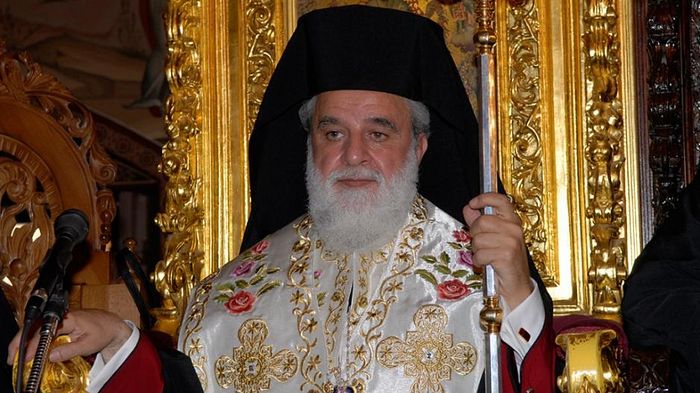
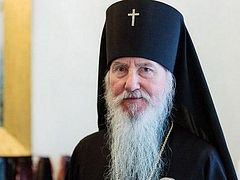
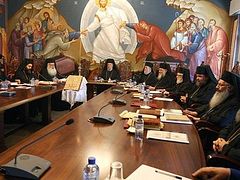
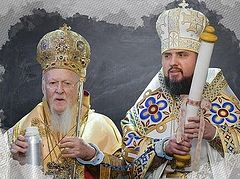
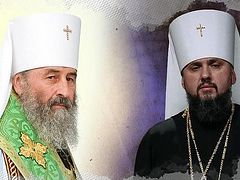
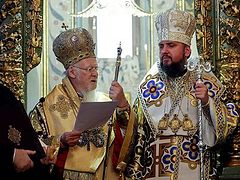
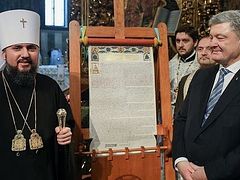
Furthermore, another Patriarchate had threatened in the past in one of its encyclicals that it would proceed into a union with the non-Chalcedonians that would be binding for the entire Church.
So to single out the Patriarchate of Constantinople would be unfair and even slanderous.
Sadly, I have to correct you on the affirmation that "the other churches don't accept".
As far as I know, the Romanian Orthodox Church, in 1994, ratified an agreement with the Orthodox Oriental "Churches" that would prepare the way to full communion. It looks like the Oriental "Churches" were not very happy with the terms and I have no idea what happened next.
However, I just wanted to highlight the fact that Constantinople is not the only see with ecumenical tendencies and desires.
On the same note, The Romanian Orthodox delegation at the Kolimbary "Synod" (Crete)is the only patriarchal delegation that signed 100% in favor of all the decisions on all the documents presented to them.
As far as I know, the Coptics have always been and remain heretics as monophysites / monothelites / miaphysites. If "some people" in the Church have come to the conclusion that the Coptics share the same faith as us, they're -most probably- ecumenists.
As a general comment, I'm wondering how long before the bishops of our Church will rise (will they ever?) and defrock patriarch Bartholomew for the infinite number of times when he ignored the Holy Canons established by the Holy Fathers of our Church? Or we'll be waiting for him to die, as was done with some of his predecessors (Meletius Metaxakis, Athenagoras I)?
May God help us!
Met. Onufry heads an AUTONOMOUS church, but NOT an autocephalous one. So the Cypriot Bishop is correct saying he thinks it's generally good principle to have an autocephalous Church as there currently is not one. The funny part is moreso how the autonomous Church headed by Met. Onufry has MORE freedoms and rights than most of the new autocephalous Churches granted by the EP (and way more than the schismatic group under Epiphany).